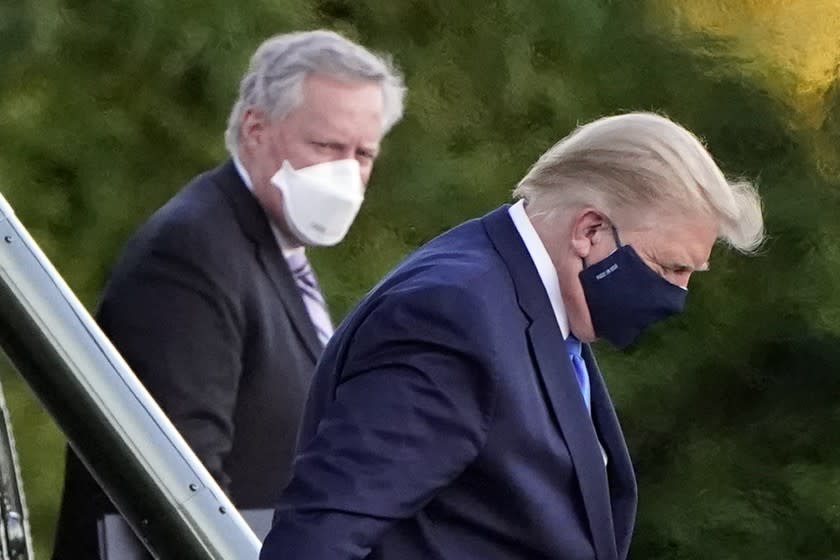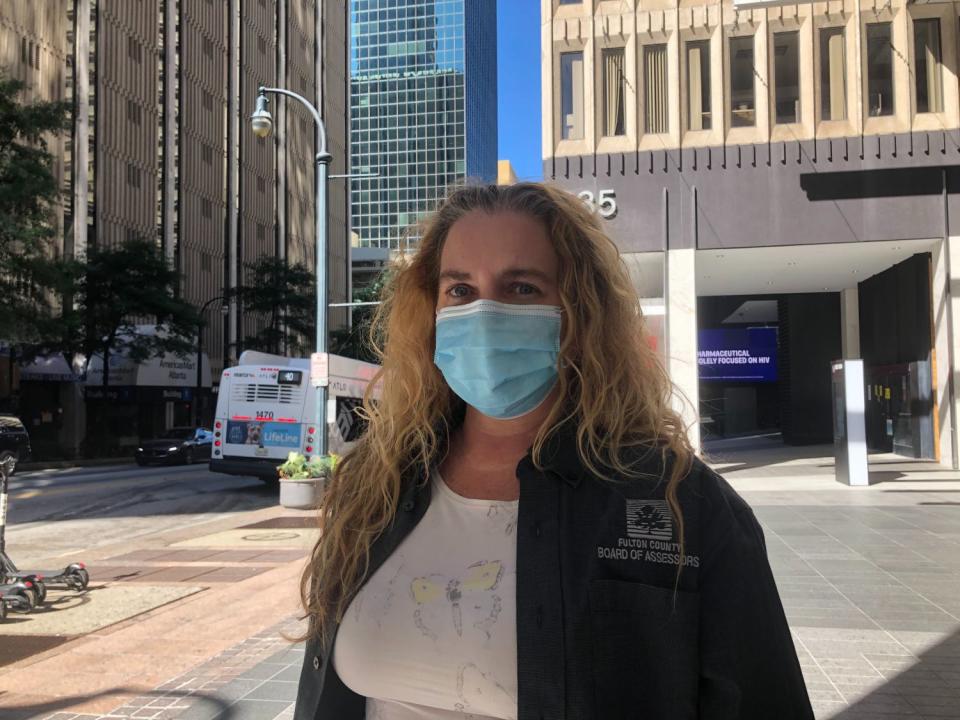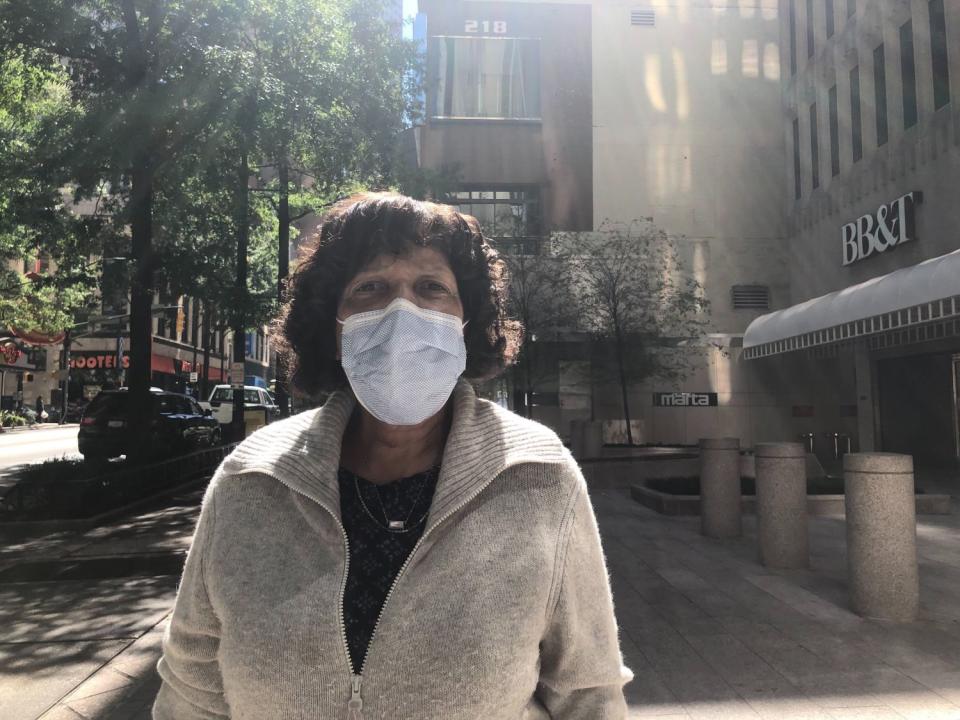From gloating to tears, Americans confront Trump's COVID illness amid mounting crises

The news broke late at night, and by Friday morning a nation confronting a pandemic, economic crisis, racial divisions and plummeting stature in the world awoke to another trauma: The president, who had long scoffed at a disease that has killed over 200,000 Americans, had contracted COVID-19.
It was startling. But it fit the surreal narrative of this conflicted country. Some wept; others gloated. A helicopter lifted the president from the White House to a hospital. Another blow — as quick and brash as a tweet — had landed in the midst of an upcoming election thrown into turmoil like so much else in this numbing, baffling, maddening year.
In health and in sickness, Trump has laid bare our divisions.

In Atlanta, property appraiser Leslie Sublett cried as she discussed his diagnosis with co-workers, suspicious that it was a lie to minimize the pandemic and to manipulate the battle around the election and the U.S. Supreme Court.
Sublett, a 50-year-old Democrat, could not shake the feeling that the United States was collapsing.
“I’ve had it up to here,” she said, raising her hand above her head. “If we can’t depend on the basic tenets of our democracy, we’re Rome in the end stages. We will cease to be. Gosh, it sounds so dark and terrible, but that’s what I’m crying over.”
In Lake Charles, La., Republican Kevin Lavergne was anxious too — not about the pandemic, which he still believes is exaggerated, but about election security, the U.S. Postal Service and the economy, especially since Hurricane Laura devastated his town in August.
“People are losing their lives, committing suicide because of the stress,” said Lavergne, 48, a construction worker who’s been unemployed since the pandemic effectively shut down the local economy. “If we don’t have it up and running and people making money, how are we going to survive?”
The president’s diagnosis came as the coronavirus continued its relentless spread, as did protests over police brutality and complaints of voter suppression and election fraud. Americans across the political spectrum were unnerved and grappling with more upheavals than they have since marches over civil rights and the Vietnam War decades ago.
“We used to call the 1960s tumultuous. The ’20s are looking to be a nation unspooling. We’re losing the threads of our democracy, busting apart,” said professor Douglas Brinkley, a presidential historian at Rice University. “It’s been probably the hardest American year since 1968. It’s been one day of bad news after another.”
Concern about whether free and fair elections are possible is particularly acute, he said, especially after the first debate between Trump and Joe Biden this week devolved into “a grotesque carnival.”
“As a country, we’ve had hard times before,” Brinkley said, but now America feels divided along party lines as they wage a “neo-civil war.”
“Everybody is spinning and there’s a kind of depression and our traditional optimism is gone,” he said.
For some, Trump’s positive coronavirus test brought schadenfreude and a sharp sense of irony, because they believed he lacked empathy as the virus raged around the world.
Wendy Harris-Gardner squealed when she woke up and turned on her TV on Friday morning to news of the president’s diagnosis, startling her husband sleeping next to her.
“It’s karma,” she said.

Harris-Gardner, 63, a legal assistant in Riverdale, Ga., said the pandemic had taken a toll on her. Her son and a friend’s daughter were infected. Her workweek was reduced to two to three days until July. Many of her colleagues were still working remotely.
“How much more chaotic can it get?” she said of the country, blaming Trump. “All I want is him the hell out of there. He made this mess.”
In Houston, voters began dropping mail ballots Friday at a makeshift polling place in a stadium parking lot. The day before, the state’s Republican governor had reduced every Texas county to a single drop-off location, and voting rights groups sued, alleging the last-minute change would confuse voters in what could become the nation’s largest swing state.
One couple drove up to cast their ballots for separate candidates: The husband, a Republican, voted for Trump; the wife, a Democrat, voted for Biden. Both wore masks, and both expressed concerns about voting fraud and recent protests over police brutality, but for different reasons.
“I’m concerned the country has resorted to that level of disruption to have their needs met,” said Patt, 79, a retired social worker who declined to give her last name. “I don’t know what’s going to happen after the election. I think it could be a civil war.”
Her husband, Steve, 72, a retired contractor who also didn’t give his full name, said he was more troubled about those who he said used the protests “as an excuse for rioting and looting.”
He worried that if Democrats won the election, they would “pack” the Supreme Court and amend the Constitution in their favor.
Maria Pedroza, 75, a retired foster mother, said she came to vote for Biden because she’s troubled by Trump’s immigration policies and worries about her 16- and 17-year-old daughters, who have been going to school online during the pandemic.
“I want them to go to school, but I’m afraid they will get sick — or I will,” Pedroza said in Spanish.
Another couple voting worried about voter suppression and intimidation.

“I’m so anxious coming here because there’s one spot — are they watching us?” said Debra Beach, 63, a retired Kroger grocery manager who had driven her wife to the ballot drop-off site. “It makes you concerned because of all the things Trump has said about it not being safe to vote and he’s going to have people watching.”
Beach planned to vote in person, but her wife, Kim Bowman, a retired AT&T worker and fellow Democrat, couldn’t wait.
“I wanted to get it over with, because what if I die?” said Bowman, 65. “It’s a life-and-death election to me because he has done so much damage to the country.”
In Detroit, artist Omari Barksdale said he dwells daily on memories of his late sister, who died of COVID-19 in March. People of color have been disproportionately infected and killed by the virus, and Barksdale, who is Black, said Trump testing positive should be a wake-up call for the nation.
“The president keeps blaming China for this virus, but this is a global virus,” said Barksdale, 46. “It’s everyone’s virus. It is impacting everyone. Trump and this country must stop creating an atmosphere of comfort with this virus.”
C.J. Grisham, a Trump supporter and Texas-based gun rights activist, said Trump’s diagnosis will probably be a different kind of wake-up call.
“This entire thing has been so overblown,” he said, adding that he believes Trump and his wife “have COVID, they’re going to get over COVID, and we’re going to get on with our lives.”
Grisham, 46, said the disease was “not worthy of the destruction to this country that politicians have caused” through economic shutdowns, capacity limits on businesses and mask requirements.
Grisham attends law school in Virginia, but the last few days his classes have all been online after a classmate tested positive for the coronavirus.
An Army veteran, Grisham was concerned about uprisings surrounding the election. When he returned to school in August, he packed some guns, ammunition and body armor.
“My biggest fear is a loss of liberty,” he said.
Hennessy-Fiske reported from Houston, Jarvie from Atlanta and Lee from Los Angeles.
This story originally appeared in Los Angeles Times.


